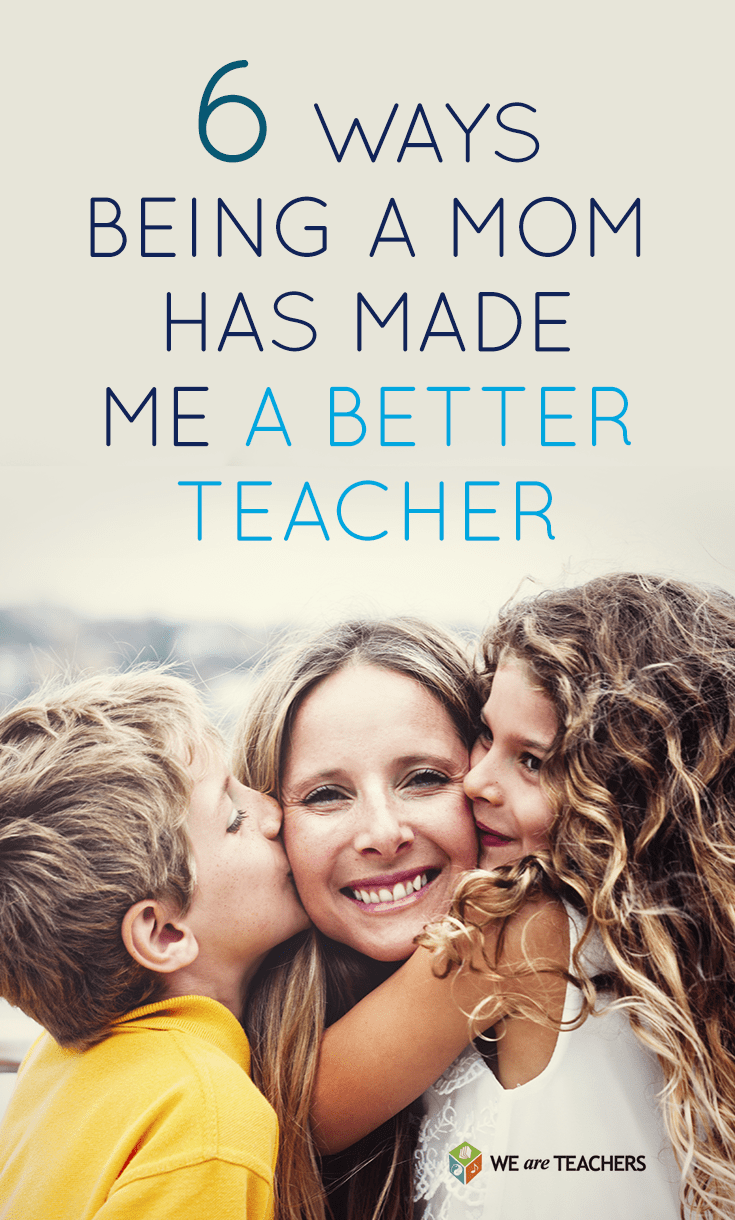A couple of weeks ago, I wrote about the ways that being a teacher helped prepare me for parenting my own kid. Luckily for me, those benefits work both ways. Being a parent has also made me a better teacher (albeit a more tired one who shows up to less after school stuff.) Here’s how:
1. I trust kids less.
Turns out, kids are liars. Like, all of them. Mine lies all the time. When I first started teaching, here’s how a typical conversation would go.
“Mary, I’m going to have to let your mom know that you were cheating on this test.”
“Miss, no! She’ll be really mad at me! You don’t know my mom; she’ll go completely crazy!”
“Well, but if this ever happens again, I absolutely have to call home…”
Most of the time, it wouldn’t happen again, and I’d never have to call home, so I’d feel like I had made the right call. Now, though…if my kid gets in trouble at school, I want to know about it, no matter what kind of torture he tells his teachers I’ll inflict on him. After being a mom to my own boy, I’m more likely to give parents the benefit of the doubt, rather than believing everything their kids say.
2. I’m way more prepared.
When parents bring baby brothers and sisters to a conference, there are always half a dozen Matchbox cars in my purse for them to play with. And I never send kids to the clinic anymore, because I can usually offer my seventh graders their choice of Paw Patrol or Star Wars bandaids. Need crayons? Would you prefer sparkly or scented? All conveniently located in the Giant Red Pocketbook of Wonders!
3. I ask more from parents in some ways…
Frequently, the homework for my class is to ask a parent or adult who lives in the house their opinion about a social issue. Or ask a parent about the first time they fell in love. Or get advice from a parent or adult about which of several topics our class should study next term.
My son is four, and it’s already like pulling teeth to find out anything about his day, even though I know all the right questions to ask. Parents want to know what their kid is doing in school. They want to have conversations with their kids, especially their teenagers, but it’s difficult for parents to force those conversations. As a teacher, I CAN force it, so I do! Not all parents are available to come to school or volunteer their time, but that doesn’t mean they should be completely out of the loop.
4. And I ask a lot less in other ways.
I remember six years ago, when I was but a wee young thing teaching sixth graders. It was not uncommon, on a Wednesday, to hear me say, “Okay, guys, we’re starting a project today, and I need you to have a poster board by Friday to finish it up.” No big deal, right? Two days to pick up a poster board; that should be no problem. Then I had a kid. And I realized that even one small child makes any kind of spontaneity on a weeknight—including a trip to Rite Aid—at the very least unpleasant.
For me, it involved moving nap times or dinner and buckling and unbuckling carseats and whining and diaper changes, etc. And, unlike most of the parents at my school, I have a car and a driver’s license. Many of them also have three or four tiny kids around the house, so picking up a poster board might require a week’s notice, which I’m now careful to give.
5. I give way less homework.
Homework sucks. My kid doesn’t even really have homework yet, and there’s still never time to get everything done in the afternoons. We get home at 4:30; he gets ready for bed at 7:30. That gives us three hours to walk the dog, throw in a load of laundry, make and eat dinner, take a bath, and hopefully spend at least a few minutes playing or reading books together before bedtime. I know my seventh graders aren’t going to bed at 7:30, but they’ve got other stuff going on. There are after school activities, and many of them are responsible for helping their little brothers and sisters with homework, or giving them baths, or making dinner. Some have after school jobs. In the end, a worksheet on grammar is pretty low priority…and it should be.
6. My understanding of the Golden Rule has changed.
I’ve always felt that the Golden Rule is underutilized in teaching. We subject kids to treatment we’d never tolerate. I’m guilty of this, too; I yell at kids, I act condescending, I refuse to let them finish a sentence because I’ve already made up my mind that what they’re saying is wrong. I try not to, but I do.
It’s important to treat kids with respect, absolutely. But I no longer try to treat kids the way I want to be treated. I try to treat them the way I would want my child to be treated. I want a teacher who will look for the best in my child every single day, no matter how he’s screwed up earlier in the week. I want a teacher who will push my kid to take risks and be brave when he’d rather sit on the sidelines. I want a teacher who will hold him accountable for his mistakes and help him work through frustration rather than take the easy way out. I want a teacher who will listen to my kid and support him —because sometimes, my support as his mom is not enough. I’m trying, although I generally come up short, to be the teacher I’d want for my son.
Now that I’m a mom, I don’t bring my students homemade cookies anymore. And I don’t show up to every after school activity, and their papers aren’t graded as quickly as they used to be. But what I’ve lost in spare time and the ability to focus on one thing at a time, I’ve gained in understanding what I truly want for my kids’ future. Plus I now have a greatly expanded supply of stickers, so I’m pretty sure it’s a net win for all of us.


